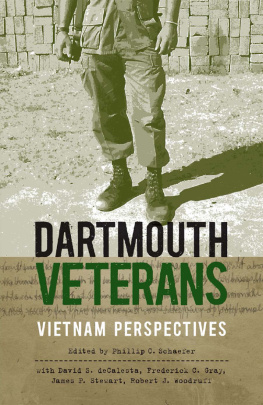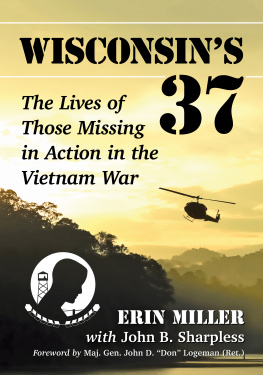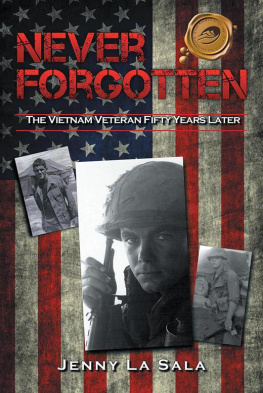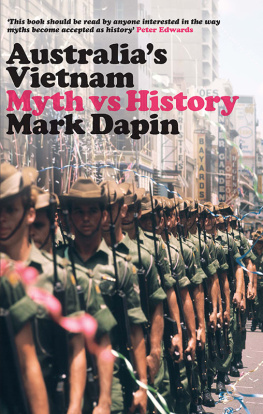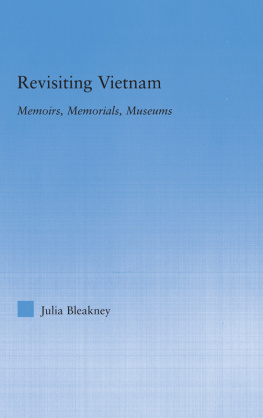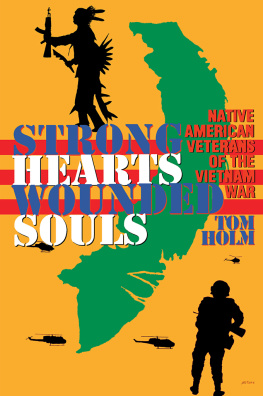Phillip C. Schaefer - Dartmouth Veterans: Vietnam Perspectives
Here you can read online Phillip C. Schaefer - Dartmouth Veterans: Vietnam Perspectives full text of the book (entire story) in english for free. Download pdf and epub, get meaning, cover and reviews about this ebook. year: 2014, publisher: Dartmouth College Press, genre: Politics. Description of the work, (preface) as well as reviews are available. Best literature library LitArk.com created for fans of good reading and offers a wide selection of genres:
Romance novel
Science fiction
Adventure
Detective
Science
History
Home and family
Prose
Art
Politics
Computer
Non-fiction
Religion
Business
Children
Humor
Choose a favorite category and find really read worthwhile books. Enjoy immersion in the world of imagination, feel the emotions of the characters or learn something new for yourself, make an fascinating discovery.
- Book:Dartmouth Veterans: Vietnam Perspectives
- Author:
- Publisher:Dartmouth College Press
- Genre:
- Year:2014
- Rating:3 / 5
- Favourites:Add to favourites
- Your mark:
- 60
- 1
- 2
- 3
- 4
- 5
Dartmouth Veterans: Vietnam Perspectives: summary, description and annotation
We offer to read an annotation, description, summary or preface (depends on what the author of the book "Dartmouth Veterans: Vietnam Perspectives" wrote himself). If you haven't found the necessary information about the book — write in the comments, we will try to find it.
A collection of essays by Dartmouth alumni recalling their Vietnam Warera experiences
Dartmouth Veterans: Vietnam Perspectives — read online for free the complete book (whole text) full work
Below is the text of the book, divided by pages. System saving the place of the last page read, allows you to conveniently read the book "Dartmouth Veterans: Vietnam Perspectives" online for free, without having to search again every time where you left off. Put a bookmark, and you can go to the page where you finished reading at any time.
Font size:
Interval:
Bookmark:
DARTMOUTH VETERANS
Vietnam Perspectives
Edited by Phillip C. Schaefer
with David S. deCalesta, Frederick C. Gray,
James P. Stewart, Robert J. Woodruff
Dartmouth College Press | Hanover, New Hampshire
Dartmouth College Press
An imprint of University Press of New England
www.upne.com
2014 Trustees of Dartmouth College
All rights reserved
For permission to reproduce any of the material in this book, contact Permissions, University Press of New England, One Court Street, Suite 250, Lebanon NH 03766; or visit www.upne.com
Library of Congress Cataloging-in-Publication Data
Dartmouth veterans: Vietnam perspectives / edited by
Phillip C. Schaefer with David S. deCalesta, Frederick C.
Gray, James P. Stewart, Robert J. Woodruff.
pages cm
Includes index.
ISBN 978-1-61168-549-7 (pbk.: alk. paper)
ISBN 978-1-61168-550-3 (ebook)
1. Dartmouth College. Class of 1964. 2. Vietnam War,
19611975 Veterans United States Biography.
3. Vietnam War, 19611975 Personal narratives,
American. I. Schaefer, Phillip C.
DS559.5.D37 2014
959.70430922dc23
[B] 2013036505
In dedication to the men of the Class of 1964 who died because of the Vietnam War
William Brewster (Bruce) Nickerson
March 17, 1942April 22, 1966
U.S. Navy Pilot/Navigator
Downed over South China Sea
Peter Whitcomb Morrison
December 29, 1942June 9, 1967
U.S. Air Force Pilot/Navigator
Downed over South Vietnam
John Wheeler Griffin III
January 14, 1943November 15, 2011
U.S. Army Infantry, Vietnam
Felled by cancer attributed to
Agent Orange exposure
The Class of 1964 arrived at Dartmouth in September 1960. It was, culturally, still the 1950s, and would remain so for the next few years. This class was rooted in the Eisenhower era but would graduate in the age of the Beatles and of Bob Dylan.
September 26, 1960, at convocation, 806 matriculants heard President John Dickey affirm his confidence in their generation of undergraduates. He stressed the need for leadershipand for responsibility. Always interested in reminding students of the relevance of international affairs and the importance of international obligation, Mr. Dickey on this occasion had little comment on the worlds problems. He did assure the class that he had no complaint over the conduct of the Cold War. And he acknowledged that he shared with most of our countrymen the enormously important confidence that, in the main, America has both the right friends and the right enemies.
Surely few members of the Class of 1964 thought of war in September 1960. Few Americans did. It was a time of insecurity, but not of immediate danger. Those who did think of imminent war focused on Europe and the Soviet threat. Just as their freshman year was beginning, Nikita Khrushchev was disrupting a session of the United Nations by banging his shoe on the table. Gary Powers and his U-2 had recently been shot down while flying surveillance over the Soviet Union.
In the presidential election campaign of 1960 there was little real foreign policy difference between the candidates, Vice President Richard Nixon and Senator John Kennedy. Kennedy accused the Eisenhower administration of allowing a missile gap to develop. Nixon disputed this. In the presidential debates that fall, Nixon and Kennedy asserted their commitment to the islands of Quemoy and Matsu off the coast of Formosa (Taiwan). There was little strategic difference here: the shared assumption was that the United States would protect Quemoy and Matsu. The debate was over who would be the stronger leader in doing this.
In his inaugural address in January 1961, President John Kennedy focused almost exclusively on the responsibility of the United States in the world. And he committed his generation and his country: Let every nation know, whether it wishes us well or ill, that we shall pay any price, bear any burden, meet any hardship, support any friend, oppose any foe, to assure the survival and the success of liberty.
At the time this seemed a statement of principle, of values, not an expanded assumption of military obligation. And certainly not a commitment of military obligation in Vietnam. In 1960 there were nine hundred American advisers in Vietnam. Four servicemen had died that year. President Kennedy sometimes reminded Americans of threats in Thailand and in the old French Indochina empire, including Vietnam. But the Cuban Missile Crisis in 1962 served as reminder that Americas primary threats were to the eastand then, briefly, south.
The undergraduate years of the 64s were a time of changeand, although only clear in retrospect, profound change. The year 1963 was marked by events that would resonate for a lifetime. In February 1963 Betty Friedan published The Feminine Mystique. As the Class of 1964 prepared for their senior year, Martin Luther King Jr. stood on the steps of the Lincoln Memorial and proclaimed to a quarter of a million on the Mall, and to the nation, I have a dreamand it was one that could no longer be denied. Before Dartmouths Thanksgiving holiday, President Kennedy was assassinated in Dallas. That season the Beatles were planning their first American tour.
As 1963 ended there were 16,300 American military personnel in Vietnam. That year 118 had died. The level of commitment and the pace of death were quickening. Quietly. Seventy-one additional Americans died between January 1 and graduation day, 1964. Nonetheless, the country was not focused closely on these engagements involving American military advisers.
At graduation in June 1964 neither President Dickey nor class valedictorian Michael Landay sounded any alarms. Dickey told the 615 graduates that he had confidence even in the long shots among the class. He assured that the world will find you out as a man. Michael Landay spoke of values and assured the audience that he and his classmates face the future with courage and with hope. Before this classs tenthindeed, fifthreunion, courage and hope would be tested.
On Saturday, June 13, 1964, the day preceding commencement, members of the class and their families gathered for the armed forces commissioning ceremony. Ninety-two received commissions that day, with another eleven scheduled to receive commission upon completion of additional requirements.
It is impossible to speculate what those 103 men and their families were thinking on this occasion. Some share their memories in the essays that follow. On that graduation weekend few were planning to go to war. James Laughlin remembered, Little did I know that the Vietnam War would explode during that time span. In 1964, I dont think anyone knew much about the place or the armed conflict that was beginning to boil up there. Michael Parker, on the other hand, recalled, The prospect of serving in the war was a looming shadow almost from the time of my commissioning. Each would serve in Vietnam.
I had joined the Marines in June 1957, just two weeks after my high school graduation. Four classmates joined me, and three of us were still seventeen years old. I hadnt thought of going to war necessarily but was prepared to do it, in an innocent, even nave, kind of way. My unit of the First Marine Brigade was deployed to Atsugi, Japan, from Kaneohe Bay, Territory of Hawaii, late in 1958 when American units were sent down to Formosa (Taiwan). We were positioned as backup for those units. In Atsugi we watched U-2 planes take off on weather reconnaissance missions. And my unit specifically replaced the one in which Lee Harvey Oswald served, moving into his barracks.
Military service was part of the life plan for my generation in my culture. We faced the imminence of the draft and elected to serve in the branch of our choice and at the timing that worked best for us. Members of the Class of 1964 considered the same choices. Electing the service branch and serving as an officer was a preferred option for many. In addition, at Dartmouth the scholarships provided by the military officer training corps were attractive at a time when financial aid was less widely available than it would be later.
Font size:
Interval:
Bookmark:
Similar books «Dartmouth Veterans: Vietnam Perspectives»
Look at similar books to Dartmouth Veterans: Vietnam Perspectives. We have selected literature similar in name and meaning in the hope of providing readers with more options to find new, interesting, not yet read works.
Discussion, reviews of the book Dartmouth Veterans: Vietnam Perspectives and just readers' own opinions. Leave your comments, write what you think about the work, its meaning or the main characters. Specify what exactly you liked and what you didn't like, and why you think so.

